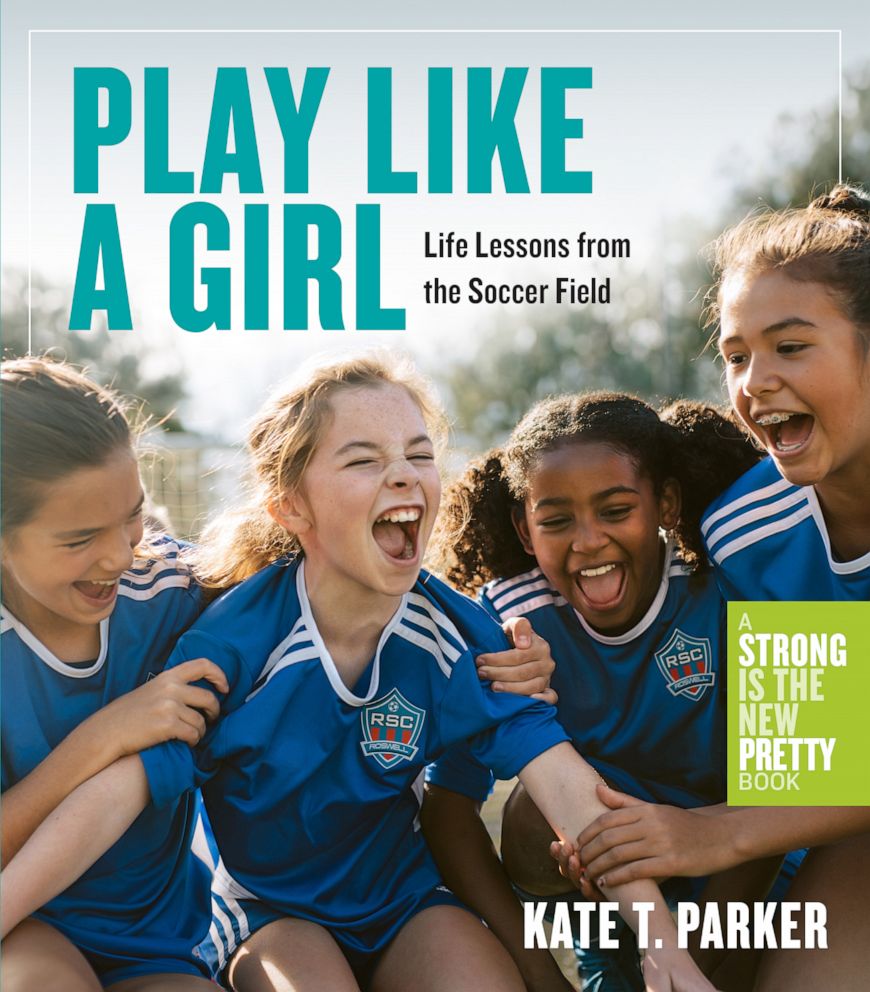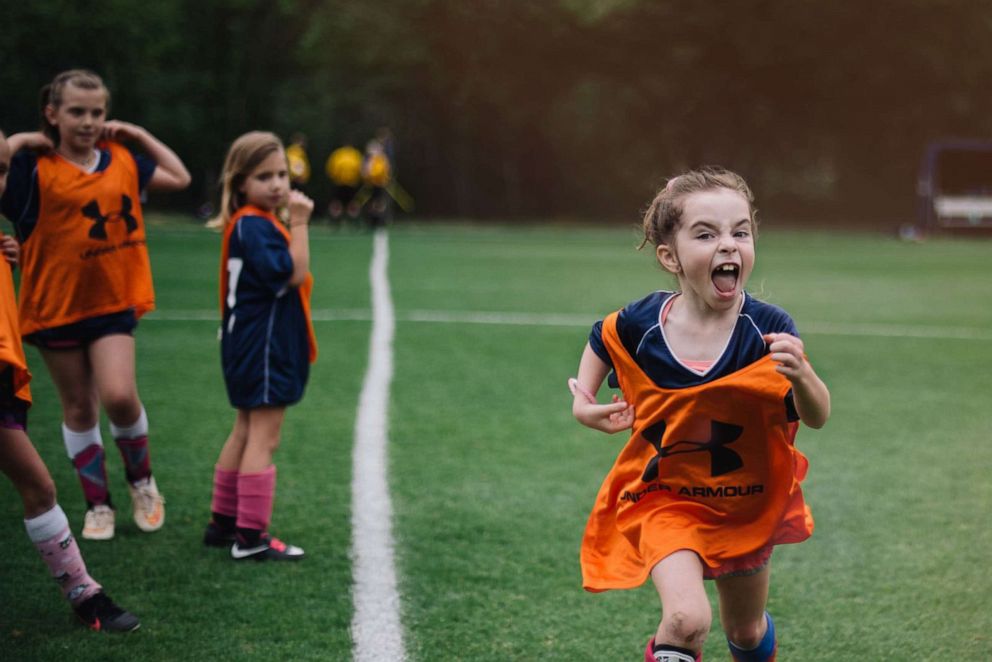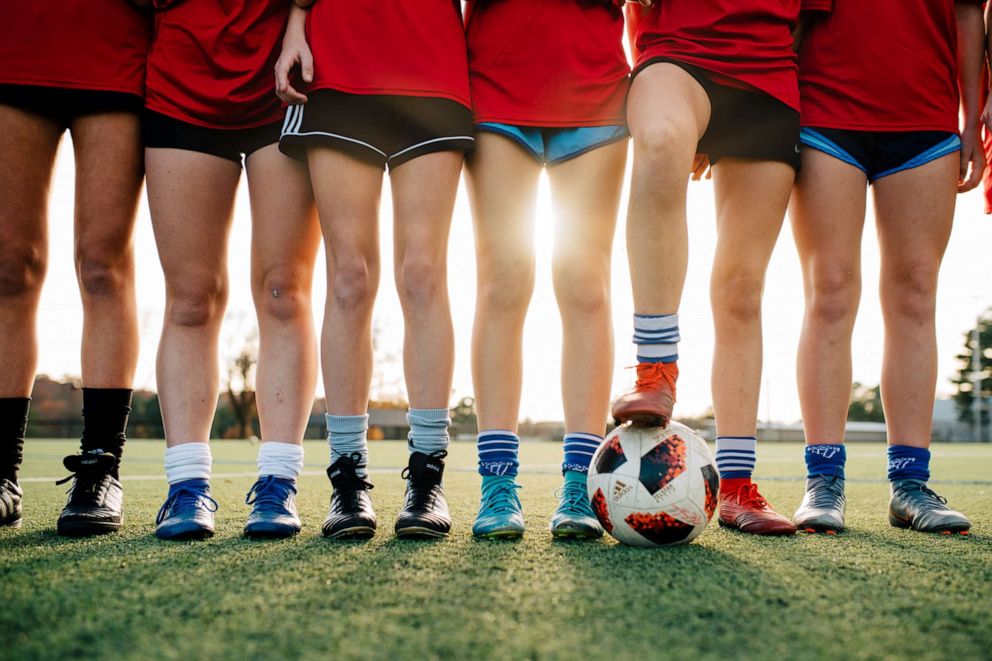Photographer Kate T. Parker always felt at home on the soccer field, but she quickly discovered that the same qualities that made her a star player weren't necessarily as valued once she unlaced her cleats.
Now, it's her personal mission to ensure that no other girl feels that way.
In her latest book, "Play Like a Girl: Life Lessons from the Soccer Field," which comes out Aug. 18, Parker pays tribute to female soccer players -- from young girls to members of the 2019 Women's World Cup championship team.
But what does it mean to "play like a girl"? In a personal essay for "Good Morning America," Parker, who also authored "Strong Is the New Pretty: A Celebration of Girls Being Themselves" and "The Heart of a Boy: Celebrating the Strength and Spirit of Boyhood," explained her connection to sports and why she believes that female athletes should never be afraid to shine.

I can't remember a time when I didn't want to play soccer. As a little girl, while I sat on the sidelines of my older brothers' games, one thought would run through my mind the entire 90 minutes: I want in. Whatever this game is… I want to play it. I wanted to be running and pushing and kicking and sweating and scoring -- I just wanted to be on that field.
I had never seen any girls play before, but that didn't bother me. When I was 7, I begged my mom to find me a team, she did, and the moment I put on my uniform and stepped onto the field for the first time, I was hooked.
Seven-year-old me was pretty impatient (so is 43-year-old me, some things never change). I was also told that I was "loud," "bossy" and "had a bad temper" -- all very true, but, to be honest, that trifecta of personality traits didn't make things easy for a girl, growing up in the '80s.
I vividly remember sitting in 7th grade math class and raising my hand to answer a question. I raised my hand with feeling, sky high and probably with an "Oooo" or a "Me, me, me" thrown in under my breath. (I was never subtle.) Plus, I knew the answer. My teacher looked at me, shook her head and said, "You are just showing off," then moved on to have the smartest boy in class answer instead.
And she was right, I was showing off.
I was showing off that I was smart, and capable and not afraid to put myself out there
That belief in myself wasn't always encouraged.

But on the soccer field, things were different. Blissfully, wonderfully different. Showing off wasn't a bad thing. And those characteristics that earned me labels like "difficult" or "pushy" off the field actually helped to make me a good -- no, great -- soccer player. All of the parts of me that other people tried to soften or change, my coaches loved. My loudness and aggression helped me win balls and score goals… and sometimes get yellow cards, but that's another story.
"Play Like A Girl" was created to help girls and women recognize the many lessons that we can learn from a sport, specifically soccer. What we find out about ourselves on the field can be so valuable to us off the field. Personally, I have gained so much from playing and being around this sport for almost 40 years. I've realized that it's more important what your body does instead of what it looks like, that your teammates will always have your back and you should have theirs, and the importance of recognizing and celebrating what you're good at and not be afraid to show it off a little bit.
This book is so close to my heart. I loved the idea of compiling and showcasing how the game changes us, as girls and women, for the better. The field and locker room (and bus, and training room and long runs) were the classrooms where I learned the most in my life. Having the chance to write and photograph the girls and women among these pages by showing some of the amazing things this sport has taught me, taught my daughters and best friends is such a gift.
There are rules to a soccer game. Don't touch the ball with your hands. No tripping or off sides. Of course, all players know these rules, but what I wanted to capture were the "unwritten" rules. For example rule (or chapter) three: "Celebrate Your Body." I wanted anyone who has ever played this game and who has lamented their "soccer legs" or worried about the size of their thighs or calves to recognize how truly beautiful and amazing those legs are, and how they look a certain way because of the demands you put on them. Or rule five: "Make Every Minute Count." Sure we know how to do this in a game, but are you doing it in your life? Are you making your time off the field count by pursuing your dreams and making your voice heard?

I am now a mother of two fierce soccer-playing girls. I have coached countless others and I carry that soccer-playing 7-year-old with me every day. I am so thankful that I was able to find people who understood and appreciated my stubbornness and drive and helped me transform them into superpowers. Too often we lose those gifts if they aren't nurtured, and I desperately didn't want my girls and the other young athletes I coached to lose their gifts. I didn't want them to quiet down if they had something to say, or pretend to be anyone they weren't.
I want you all to know the same.
Sometimes, the things that you may not like about yourself or that make you "too much" or embarrass you, can be the most powerful and wonderful things about you. The aggression, determination and intensity that society sometimes views as liabilities in girls and women are actually your superpowers, both off and on the field.
Those superpowers you are born with? Please don't lose them. Don't soften them. And don't change them to make someone else happy.
Think about what yours are. What makes you great? What makes you stand out on the field and in life? Those are gifts, and too often we lose those gifts. We lose our superpowers.
The players in this book have all struggled. From girls just learning the game to some of the best players in the world, they've all won. They've lost. They've been injured. They've been cut from teams they desperately wanted to make. They've failed. They've sat the bench, just like you.

But, it didn't break them. They have persevered. They have learned from this sport. Soccer helps teach us how to deal with life. Life and soccer are tough, but so are you.
We are often taught so early not to shine because people might not like you or be jealous of you. Don't let them! Shine away! Make the big play. Leave it all out there on and off the field.
I was lucky. I had parents who didn't try to change who I was. They encouraged me to pursue a sport that celebrated the hard charging self that I was (and am) on and off the field. I am so thankful to carry on this message with my work today: that whatever and whoever you are, can and should be celebrated, not softened or changed to make others happy.
I love that sports encourage that part of us. I love that they allow us to be unapologetically ourselves, no matter what age. I saw this in so many of the women and girls in this book. Their stories make me feel hopeful: hopeful that our passions, like soccer, encourage us to be true to ourselves. By finding our voices on the field, we find them off as well. It inspired me to remember my superpowers, and that even though I don't play soccer as much as I did as when I was younger, that those qualities that made me stand out on the field make me stand out as a mom, as an author, as a business owner, an advocate and photographer. This book helped me find my voice again and made me remember how much joy there is to be found within those white lines of the field.
There are so many voices telling us not to be who we really are. Sometimes it is hard to remember or figure out who that is. We don't have to listen to the "nos" or the "shouldn'ts."
Own your strength.
Celebrate it.
That is exactly what playing like a girl means.




